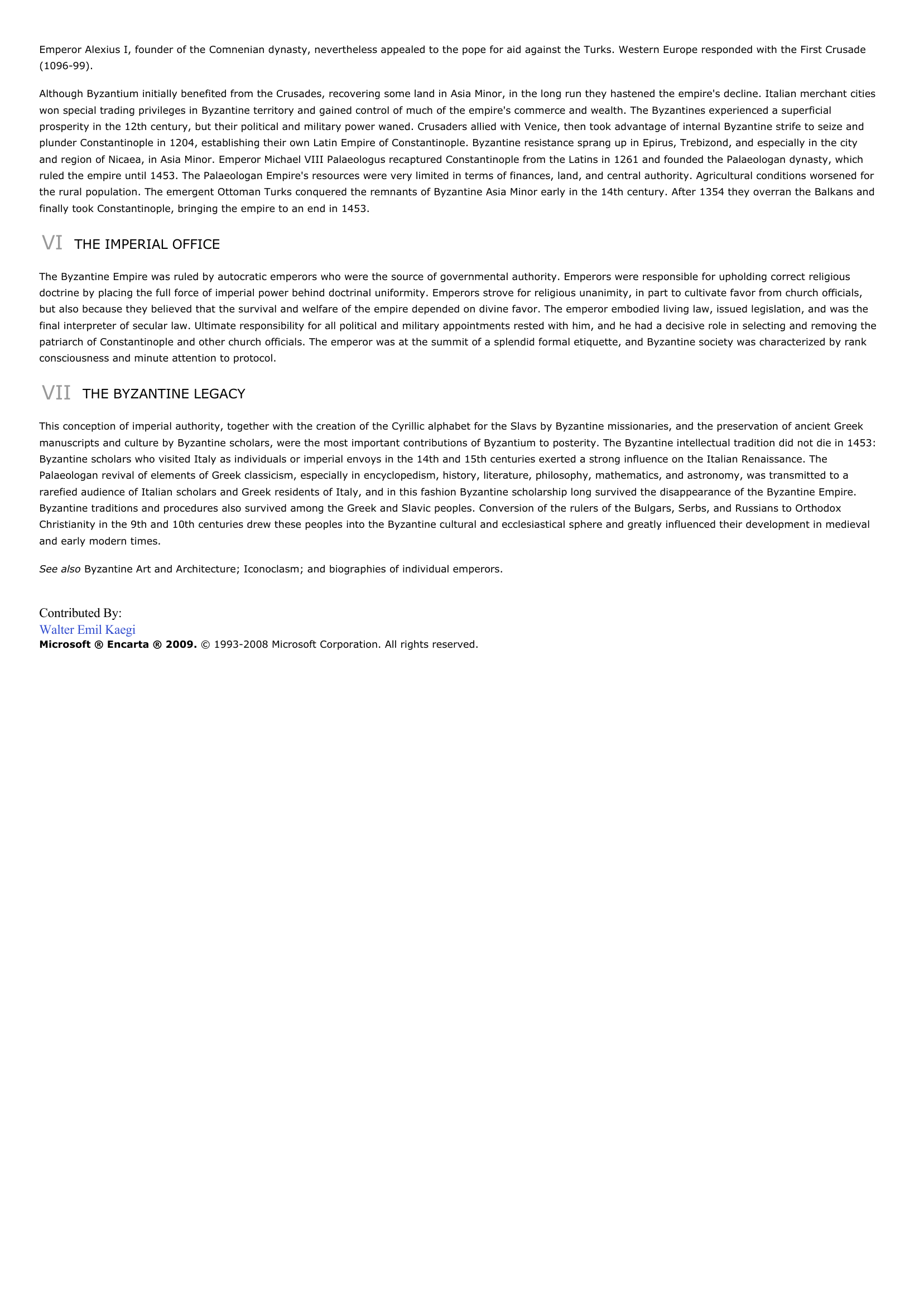Byzantine Empire .
Publié le 03/05/2013
Extrait du document
«
Emperor Alexius I, founder of the Comnenian dynasty, nevertheless appealed to the pope for aid against the Turks.
Western Europe responded with the First Crusade(1096-99).
Although Byzantium initially benefited from the Crusades, recovering some land in Asia Minor, in the long run they hastened the empire's decline.
Italian merchant citieswon special trading privileges in Byzantine territory and gained control of much of the empire's commerce and wealth.
The Byzantines experienced a superficialprosperity in the 12th century, but their political and military power waned.
Crusaders allied with Venice, then took advantage of internal Byzantine strife to seize andplunder Constantinople in 1204, establishing their own Latin Empire of Constantinople.
Byzantine resistance sprang up in Epirus, Trebizond, and especially in the cityand region of Nicaea, in Asia Minor.
Emperor Michael VIII Palaeologus recaptured Constantinople from the Latins in 1261 and founded the Palaeologan dynasty, whichruled the empire until 1453.
The Palaeologan Empire's resources were very limited in terms of finances, land, and central authority.
Agricultural conditions worsened forthe rural population.
The emergent Ottoman Turks conquered the remnants of Byzantine Asia Minor early in the 14th century.
After 1354 they overran the Balkans andfinally took Constantinople, bringing the empire to an end in 1453.
VI THE IMPERIAL OFFICE
The Byzantine Empire was ruled by autocratic emperors who were the source of governmental authority.
Emperors were responsible for upholding correct religiousdoctrine by placing the full force of imperial power behind doctrinal uniformity.
Emperors strove for religious unanimity, in part to cultivate favor from church officials,but also because they believed that the survival and welfare of the empire depended on divine favor.
The emperor embodied living law, issued legislation, and was thefinal interpreter of secular law.
Ultimate responsibility for all political and military appointments rested with him, and he had a decisive role in selecting and removing thepatriarch of Constantinople and other church officials.
The emperor was at the summit of a splendid formal etiquette, and Byzantine society was characterized by rankconsciousness and minute attention to protocol.
VII THE BYZANTINE LEGACY
This conception of imperial authority, together with the creation of the Cyrillic alphabet for the Slavs by Byzantine missionaries, and the preservation of ancient Greekmanuscripts and culture by Byzantine scholars, were the most important contributions of Byzantium to posterity.
The Byzantine intellectual tradition did not die in 1453:Byzantine scholars who visited Italy as individuals or imperial envoys in the 14th and 15th centuries exerted a strong influence on the Italian Renaissance.
ThePalaeologan revival of elements of Greek classicism, especially in encyclopedism, history, literature, philosophy, mathematics, and astronomy, was transmitted to ararefied audience of Italian scholars and Greek residents of Italy, and in this fashion Byzantine scholarship long survived the disappearance of the Byzantine Empire.Byzantine traditions and procedures also survived among the Greek and Slavic peoples.
Conversion of the rulers of the Bulgars, Serbs, and Russians to OrthodoxChristianity in the 9th and 10th centuries drew these peoples into the Byzantine cultural and ecclesiastical sphere and greatly influenced their development in medievaland early modern times.
See also Byzantine Art and Architecture; Iconoclasm; and biographies of individual emperors.
Contributed By:Walter Emil KaegiMicrosoft ® Encarta ® 2009. © 1993-2008 Microsoft Corporation.
All rights reserved..
»
↓↓↓ APERÇU DU DOCUMENT ↓↓↓
Liens utiles
- Justinien Ier par Evelyne Patlagean Chargée d'enseignement à la Faculté des Lettres et Sciences humaines de Caen Justinien Ier a cru restaurer, dans une splendeur qui ne finirait plus, l'Empire d'une Rome devenue chrétienne et byzantine.
- empire du songhaï
- Le judaïsme sous le haut-empire
- Comment la France met-elle en place un vaste empire colonial ? Comment émerge la société coloniale ?
- LES TRANFORMATIONS ECONOMIQUES SOUS LE SECOND empire

































